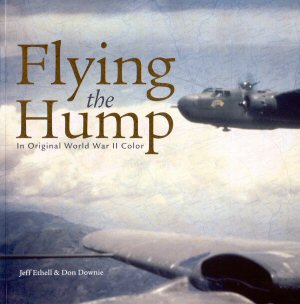
Flying the Hump In Original World War II Color Book Review
By Michael Benolkin
| Date of Review | April 2004 | Title | Flying the Hump In Original World War II Color |
|---|---|---|---|
| Author | Jeff Ethell & Don Downie | Publisher | Osprey Publishing |
| Published | 2004 | ISBN | 0-7603-1915-4 |
| Format | 168 pages, softbound | MSRP (USD) | $19.95 |
Review
Well before the Berlin Airlift, the first major long-term airlift supply effort in aviation history was born during World War II when the Japanese captured the Burma Road, cutting off the supply lines between northern India and China. This often overlooked theater, referred to as the CBI (China, Burma, India), was suddenly in jeopardy as allied operations in China would not be able to continue without food, ammunition, fuel and other logistical essentials. Standing between northern India and China were several hazards including Japanese fighters, the towering Himalaya mountains and some of the worst flying weather in the world.
Flying the Hump was considered was considered more hazardous than flying a bomber over Europe, with over 1,300 pilots and crew killed and over 500 transport aircraft lost. Nevertheless the air bridge between India and China was maintained and airlift would come into its own. With the lessons learned in the CBI, future airlift operations like the Berlin Airlift were assured a much greater probability of success.
The late Jeff Ethell and Don Downie have compiled an interesting insight into the stories behind the history of CBI airlift operations. This book is also full of beautiful photography that keeps in line with Jeff Ethell's other historical military titles - all full-color photography.
This is a must-have for the aviation historian and the modeler alike. Flying the Hump is an excellent read and fills that much-overlooked portion of US military aviation history.
My sincere thanks to Motorbooks International for this review sample!








